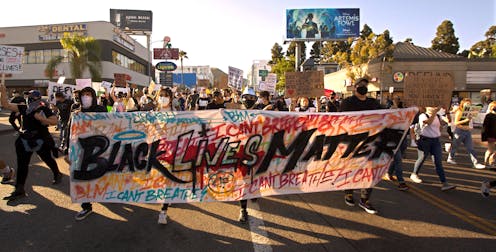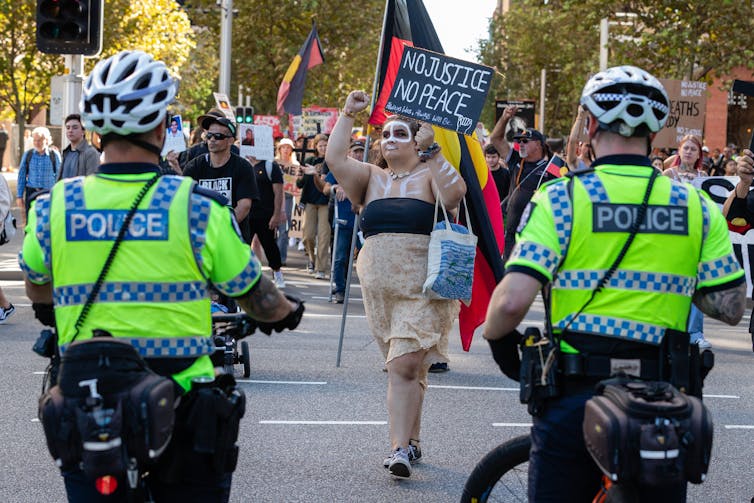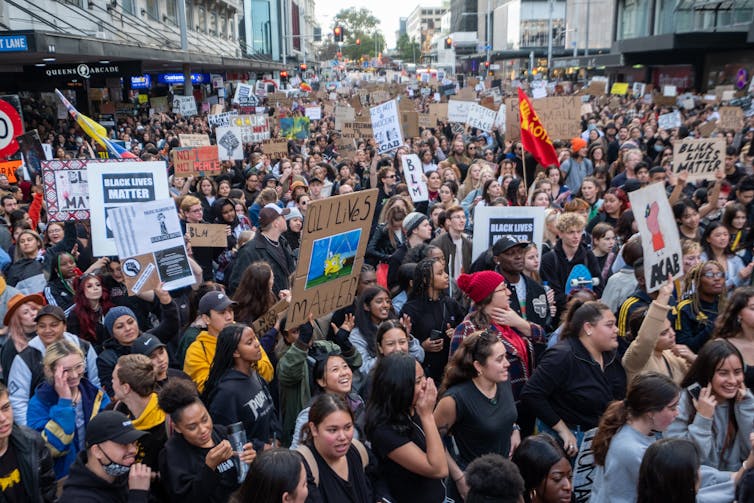The sentencing of George Floyd’s killer has lessons for policing in Australia and New Zealand too
- Written by James Mehigan, Senior Lecturer in Law, University of Canterbury

The imminent sentencing[1] of former Minneapolis police officer Derek Chauvin for the 2020 murder of George Floyd will be closely watched around the world. While the crime happened in the United States, its resonance in the Black Lives Matter movement[2] has been truly international.
In New Zealand and Australia, the June 25 sentencing offers an opportunity to take stock of racial disparities in their own criminal justice systems. They may be geographically distant, but we shouldn’t imagine the underlying cultural problems are exclusive to the US.
Floyd’s death was not just brutal and outrageous, but also distressingly routine. While some high-profile police killings of Black people have made the news and triggered protests and rioting, countless others have gone without the same coverage or impact.
For every Eric Garner[3] (suffocated in 2014 by the NYPD while saying “I can’t breathe”) or Freddie Gray[4] (who died of a broken spine after his arrest in Baltimore in 2015), there have been multiple other cases.
The conviction of Chauvin is therefore to be welcomed, not least because it shows such prosecutions can be successful. But it’s also important to remember that US policing itself has not necessarily changed very much, despite the past year’s protests and ongoing advocacy for reform.
At heart, the police remains a brutal institution. Some US police forces can be traced back to slave patrols in the 1700s[5], established to chase down escaped slaves or quell revolts. The culture of an institution built by one race for the subjugation of another is hard to change without some kind of radical reinvention.
 A Stop Black Deaths in Custody rally in Perth, April 2021, to mark the 30th anniversary of the Royal Commission into Aboriginal Deaths in Custody. AAP
A Stop Black Deaths in Custody rally in Perth, April 2021, to mark the 30th anniversary of the Royal Commission into Aboriginal Deaths in Custody. AAP
Policing in a post-colonial era
Again, this is not something confined exclusively to the US. The police forces of New Zealand and Australia were established as component parts of a colonial project that clearly harmed and disadvantaged their respective Indigenous populations.
This foundational fact is reflected in the reality of policing today. Police forces built to enable colonial subjugation will not change simply because sections of modern society have developed a more progressive racial outlook.
Even if you argue the history of colonial policing does not actively inform contemporary police cultures in Australia and New Zealand, there is no denying the outcomes for Indigenous people in their criminal justice systems are lamentable.
Read more: Australia's news media play an important role reminding the country that Black lives still matter[6]
It is now just over 30 years since the landmark report of Australia’s Royal Commission into Aboriginal Deaths in Custody[7]. In that time, 474 Aboriginal and Torres Straits Islander people met their deaths following police contact[8]. That equates to more than one such death each month.
In New Zealand, Māori are seven times more likely[9] than Pākehā to be at the receiving end of police violence. If the outcomes are not fatal as often as in Australia, deaths in custody still reflect a serious racial disparity.
In 2012, the Independent Police Complaints Authority reviewed the 27 deaths in custody[10] from the previous decade. Almost half were Māori. If this is a small sample, it still mirrors the disproportionately high number of Māori in the prison system[11]: Māori make up 16%[12] of the country’s population but 52% of prisoners.
 The Black Lives Matter movement went global: Aucklanders listen to speeches during a rally in 2020. GettyImages
The Black Lives Matter movement went global: Aucklanders listen to speeches during a rally in 2020. GettyImages
A long way to go
These discrepancies are hard to explain away. There is clearly a race problem in criminal justice in Australia and New Zealand, just as there is in the US.
The conviction and sentencing of Derek Chauvin may signal change, but it will take time. President Joe Biden supports proposed laws around police misconduct and racial profiling, but advocates are frustrated[13] by the slow pace of reform.
Calls to “defund the police[14]” in the US, and growing disquiet at the increasingly paramilitary nature of US policing, may not yet have direct echoes in Australia and New Zealand.
Read more: The United States is at risk of an armed anti-police insurgency[15]
But if and when George Floyd’s killer is sent to jail himself, we should take the opportunity to reflect on how far our own criminal justice systems have to go.
The Black Lives Matter movement demonstrates there is a global appetite for meaningful change to policing practices, as the protests in Australia and New Zealand highlighted.
This year, New Zealand has begun a government process of apologising[16] for the dehumanising “dawn raids” of the 1970s, when Pasifika people deemed to be overstaying their visas were dragged from their homes by police and deported.
The history of colonial policing is something we are still processing — moving beyond those colonial (and often racist) mindsets towards a system that values rights, accountability and the rule of law. The moment is ripe for reform.
References
- ^ sentencing (www.mprnews.org)
- ^ resonance in the Black Lives Matter movement (www.cbsnews.com)
- ^ Eric Garner (www.theguardian.com)
- ^ Freddie Gray (www.bbc.com)
- ^ slave patrols in the 1700s (time.com)
- ^ Australia's news media play an important role reminding the country that Black lives still matter (theconversation.com)
- ^ Royal Commission into Aboriginal Deaths in Custody (www.austlii.edu.au)
- ^ met their deaths following police contact (www.theguardian.com)
- ^ seven times more likely (www.nzherald.co.nz)
- ^ reviewed the 27 deaths in custody (www.ipca.govt.nz)
- ^ high number of Māori in the prison system (www.corrections.govt.nz)
- ^ make up 16% (www.stats.govt.nz)
- ^ advocates are frustrated (edition.cnn.com)
- ^ defund the police (www.theguardian.com)
- ^ The United States is at risk of an armed anti-police insurgency (theconversation.com)
- ^ apologising (www.mpp.govt.nz)

















